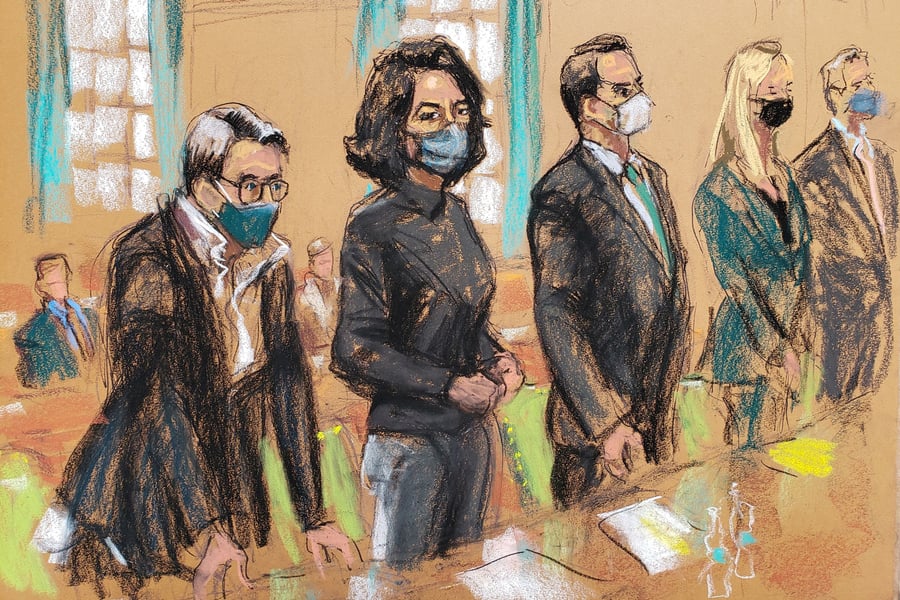On Monday, Nov. 29, lawyers will begin opening arguments for the much-anticipated trial of Ghislaine Maxwell, the 59-year-old former girlfriend and alleged procurer for Jeffrey Epstein, the disgraced billionaire who died by suicide in prison in 2019 after being arrested on multiple sex-trafficking charges. Maxwell is charged with six counts related to sex trafficking for allegedly grooming underage girls for Epstein to sexually abuse between 1994 and 2004.
After Epstein’s arrest in 2019, much media scrutiny fell on Maxwell, who was implicated in many of his alleged victims’ statements against him. Maxwell was arrested in 2020, and has been detained in a Brooklyn federal prison ever since. (She has pleaded not guilty to all charges.) In the subsequent months, there has been a flurry of filings and motions from both the prosecution and defense, offering a window into the arguments they plan to make in court.
The state’s case centers on four women who claim they were groomed by Maxwell — to meet Epstein’s sexual desires — between 1994 and 2004, when they were minors. “The question at trial,” prosecutors wrote, “will be whether the defendant took steps to provide Jeffrey Epstein with access to girls under the age of 18, knowing that Epstein intended to have sexual contact with those girls.” Prosecutors say Maxwell would befriend the girls at first, taking them shopping or to the movies, before introducing them to sexual topics and eventually being present during sex acts between Epstein and the victim. (Maxwell has vehemently denied the allegations.)
Pre-trial motions have shown the state will make its case relying heavily on the victims’ testimony. That could provide an opening for the defense to question the women’s memory of what happened, according to Duncan Levin, a former federal prosecutor who is now a managing partner at the law firm Tucker Levin, PLLC. “In a case like this, the general defense will be to question the memory, reliability and credibility of the witnesses who are testifying,” Levin says. “And I think given the age of some of the allegations, it’s something that they’ll be particularly keen to do.”
Prosecutors have also indicated they will argue Maxwell had two co-conspirators besides Epstein, who have not been named publicly. The defense has objected to the introduction of the co-conspirators as evidence, saying the state only shared the names with their team weeks before the start of the trial. The judge has not ruled on the issue yet.
Maxwell’s defense team and the prosecution have also sparred over Epstein’s address book — his so-called “little black book.” The defense has moved to block the book from being entered into evidence, saying it has been “clearly altered” by a former employee of Epstein’s who stole it and tried to sell it. The book, versions of which have been published years ago by Gawker and Insider, is in the FBI’s possession contains hundreds of the late sex criminal’ most powerful contacts.
The defense has also sought — unsuccessfully — to keep accusers from being referred to as victims or minors and to block a psychologist from testifying about grooming as an expert witness. The defense did win a small victory in the later instance, though, because the judge agreed to block the witness from discussing the idea that grooming can be done to facilitate abuse by a third party, which the defense has referred to as “grooming by proxy.”
The defense has further railed against the conditions in the Metropolitan Detention Center where Maxwell has been held for nearly 17 months, and has claimed the U.S. Attorney only pursued charges against Maxwell after Epstein’s death, looking to shift responsibility for his crimes onto her. “The government has sought to substitute our client for Jeffrey Epstein,” the defense wrote. (This is, unsurprisingly, also what some of Maxwell’s former friends believe, as well.)
Perhaps the biggest question ahead of the trial is whether Maxwell will testify on her own behalf. It could give her a chance to make her version of events clear to the jury, but opens her up to cross-examination. Levin thinks Maxwell may follow the example of other recent defendants to take the stand in their own defense, like Elizabeth Holmes and Kyle Rittenhouse, to try to make her appeal to the jurors. “Particularly in a case like Maxwell’s, jurors will want to hear from her and will want to see more than just an attack on the victim’s credibility and memory,” he says. “Jurors will likely see through that. They’ll want to hear her side of the story. She has no obligation to do it. But, you know, it’s just as risky to stay quiet as it is to talk.”
Additional reporting by EJ Dickson.
From Rolling Stone US






































